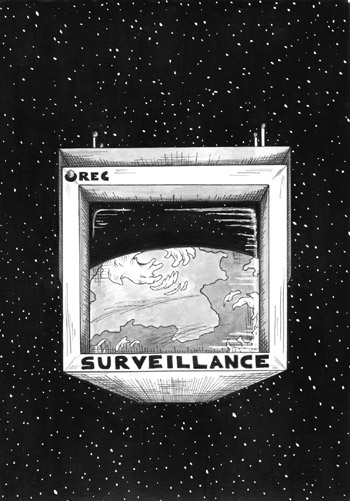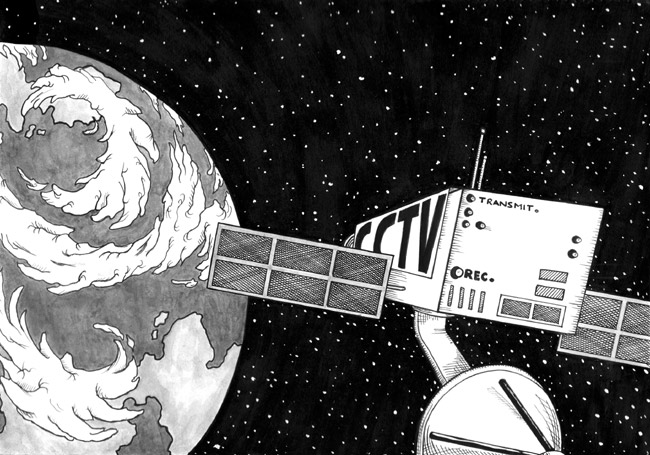
| HOME |
| NERVE |
| REVIEWS |
| ARCHIVE |
| EVENTS |
| LINKS |
| ABOUT US |
| CONTRIBUTORS |
| BACK ISSUES |
| CONTACT US |
Back to index of Nerve 24 - Summer 2014
Information Overload
 By
Ritchie Hunter
By
Ritchie Hunter
Artwork by Sean Biggs
"I don't want to live in a world where everything that I say, everything that I do, everyone I talk to, every expression of love or friendship is recorded." Edward Snowden.
Why do the US National Security Agency (NSA) or GCHQ in the UK need to monitor all the information in the universe?
One thing's for sure: the indiscriminate mass surveillance of people is not just to fight terrorism, as they claim. And they can't possibly process the content of all the messages they collect.
It's not easy to make sense of what's going on here, but there seems to be a number of things happening:
Individual Monitoring
From targeting adverts at potential customers and creating needs, to 'listening' in on 'suspects', this must be the most lucrative. It has emerged from the Snowden disclosures that there is a chase for economic advantage pushing much of this 'Big Data' collection. The NSA is involved in industrial espionage and doesn't just limit it's espionage to issues of national security.(2) They've been spying on big German companies that compete with US firms and giving this info to their own firms. This is done with the collusion of the giant internet corporations, to maintain the US as a world economic power. Britain's role is to provide vast amounts of information to the US from tapping data cables that come ashore in Cornwall.
GCHQ also plant false information to discredit reputations and the MOD, along with arms company BAE systems, are developing ways to 'shape' behaviour through social media.(3)
Mass Monitoring
This is the most puzzling aspect of 'Big Data' collection. Sophisticated equipment used under programmes such as Dishfire(4) can track anyone using a mobile phone, analysing these up to 5bn times a day!(5) They collect and store quidzillions of messages and monitor peoples' activity and movement by 'triangulation' of phone signals.
The UN has developed a system called Global Pulse that monitors population movement. They say their analysis of Call Detail Records (CDRs) can be used in development or humanitarian contexts. For instance they can monitor the flow of mass populations during and after natural disasters: how malaria can spread via human movement, or the passage of commuters through a city at peak times.(6)
The UN shares this data with companies, which can lead to abuses in a 'market opportunity', profit driven system. And, with worrying implications for activists, mass monitoring can be used by the state to map areas of possible 'trouble'. By analysing where groups are moving; to predict where civil disobedience is about to break out, or to see where there is unrest. This is not just about threats to state security, it's about control. Along with spies in environmental groups acting as agent provocateurs and wire-tapping of Hillsborough victims, the state is tooling up to tackle mass protest.
Given the state's record, over many decades, of phone tapping and bugging trade union activists and 'left' people in general, the claims that all this is to apprehend terrorism is nonsense.
There is also the proposed collection of medical records in one place for, it is argued, a better understanding of disease and illness. Because of a mass outcry that this information will become available to private companies, the government have now postponed this till the Autumn.
 |
'Rainy Day' Monitoring
Those in power are hoovering up as much data as they can, just because they can. They collect everything in sight, not because they intend to use it, but to cover all the bases; storing this data for the future for, who knows, it might be needed. This is a type of spy paranoia that sees 'unknown unknowns' everywhere, and which hates and fears workers' organising.
There is nothing new in Governments collecting data secretly (and in recent times not even telling their own cabinets what's going on). What is new is the amount collected.
The internet is a tool that can be used for tremendous public good, bringing a way of joint communication to the world that could lead to solving problems of skewed distribution from the over-developed world (us) to those that have little. But, as with all technology, it depends who control it.
For further reading see: The Snowden Files, by Luke Harding
References:
- Guardian 01.02.14, I have some stuff you may be interested in
- Guardian 27.01.14, Snowden: NSA engages in industrial espionage
- Guardian 17.03.14, MOD chatbots could join the secret cyberwar
- Guardian 18.01.14, Heather Brooke, NSA leaks: Dishfire revelations expose the flaws in British laws on surveillance
- Guardian 18.12.13, Snowden offers to help Brazil on spying if he is given asylum
- www.unglobalpulse.org/Mobile_Phone_Network_Data-for-Dev
Notes:
When the Intelligence Service Act was passed in 1994 it included a line that Britain's spy agencies could legitimately see intelligence that would support the “economic wellbeing” of the country(Guardian 26.10.13 Nick Hopkins Analysis)
In 2007, the rules were changed to allow the NSA to analyse and retain
any British citizens' mobile phone and fax numbers, emails and IP addresses
swept up by its dragnet.
(Guardian 21.11.13 UK secretly agreed to US surveillance of British citizens)
“Leaky” smartphone apps, such as Angry Birds game, transmits the users details across the internet
US and British intelligence agencies have successfully cracked much of the online encryption relied upon by hundreds of millions of people to protect the privacy of their personal data, online transactions and emails, according to top-secret documents revealed by former contractor Edward Snowden. (Revealed: how US and UK spy agencies defeat internet privacy and security James Ball, Julian Borger and Glenn Greenwald Guardian Weekly, Friday 6 September 2013 )
The UN has also been monitoring Twitter conversations in Indonesia to:
“...understand how conversation volume trends relate to world events.
In particular, this project monitored food-price related tweets between
January 2011 and December 2012 to see if variations in their volumes could
be connected with food and fuel price inflation.” www.unglobalpulse.org/social-media-social-protection-indonesia